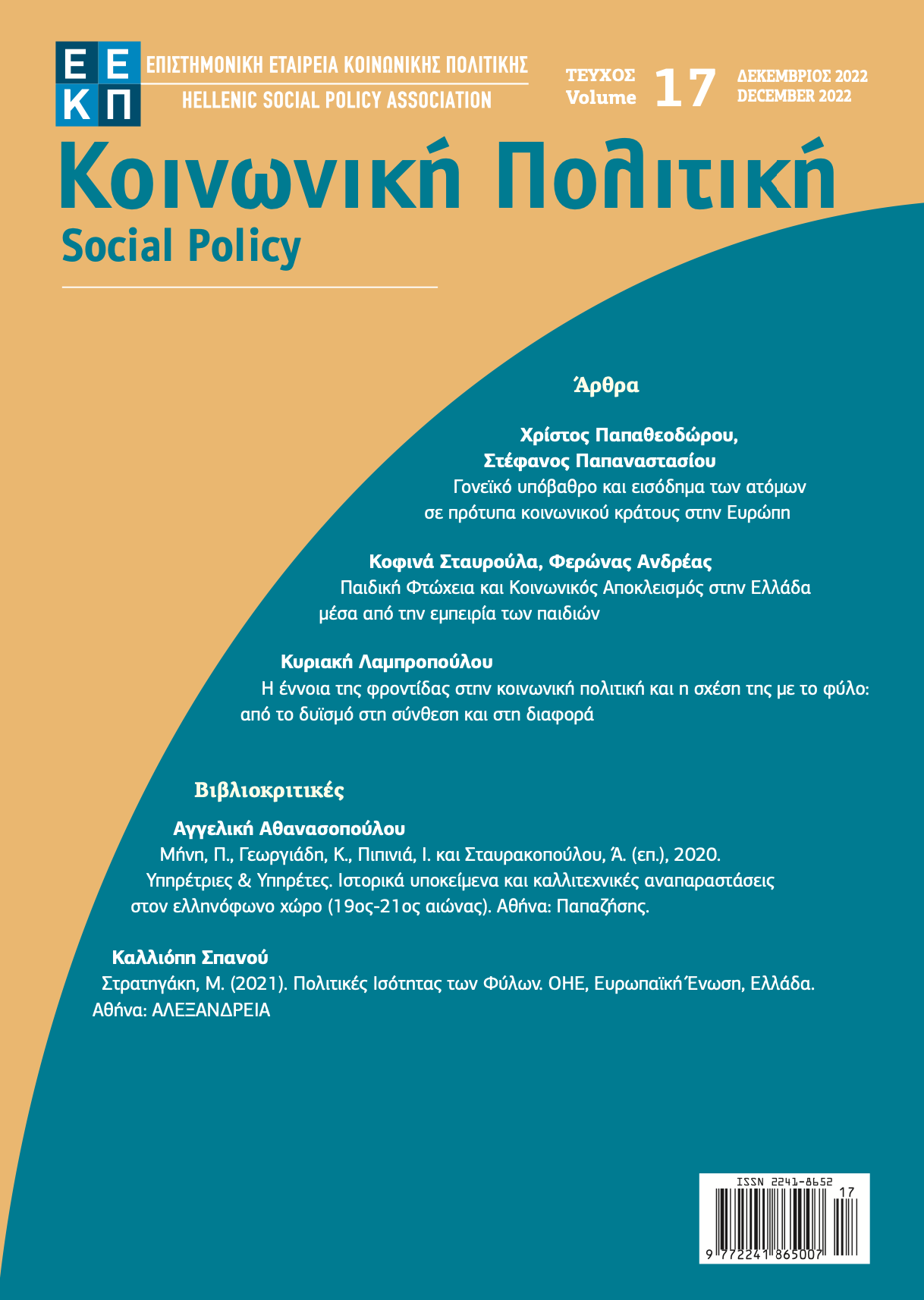H έννοια της φροντίδας στην κοινωνική πολιτική και η σχέση της με το φύλο: από το δυϊσμό στη σύνθεση και στη διαφορά
Περίληψη
Η προσέγγιση της φροντίδας στην κοινωνική πολιτική από τη σκοπιά του φύλου έχει αποτελέσει το κεντρικό σημείο αναφοράς της μέχρι σήμερα θεώρησης του ζητήματος, όχι μόνο γιατί οι γυναίκες αποτελούν την πλειοψηφία των φορέων φροντίδας, αλλά και γιατί η αποδόμηση της έννοιας της φροντίδας στις επιμέρους διαστάσεις της, όπως επίσημη-ανεπίσημη, αμειβόμενη-μη αμειβόμενη, η φροντίδα ως σχέση-δραστηριότητα, αγγίζει την ίδια την εννοιολόγηση του φύλου. Στόχος του παρόντος άρθρου είναι η θεώρηση του τρόπου που έχει γίνει αντιληπτή η σχέση φύλου και φροντίδας στη θεωρία της κοινωνικής πολιτικής. Επιχειρείται μια περιοδολόγηση, με κριτική επισκόπηση σχετικών θεωρητικών προσεγγίσεων από τις αρχές της δεκαετίας του 80 μέχρι σήμερα, με στόχο τη διερεύνηση των ορίων τους, τόσο για την κατανόηση της θέσης των φύλων στη φροντίδα όσο και κατά προέκταση των μοντέλων κοινωνικής προστασίας που αυτές συνεπάγονται.
Λεπτομέρειες άρθρου
- Πώς να δημιουργήσετε Αναφορές
-
Λαμπροπούλου Κ. (2023). H έννοια της φροντίδας στην κοινωνική πολιτική και η σχέση της με το φύλο: από το δυϊσμό στη σύνθεση και στη διαφορά. Κοινωνική Πολιτική, 17, 35–55. ανακτήθηκε από https://ejournals.epublishing.ekt.gr/index.php/eekp/article/view/32810
- Τεύχος
- Τόμ. 17 (2022)
- Ενότητα
- Άρθρα

Αυτή η εργασία είναι αδειοδοτημένη υπό το CC Αναφορά Δημιουργού 4.0.
Οι συγγραφείς των άρθρων που δημοσιεύονται στο περιοδικό διατηρούν τα δικαιώματα πνευματικής ιδιοκτησίας επί των άρθρων τους, δίνοντας στο περιοδικό το δικαίωμα της πρώτης δημοσίευσης. Άρθρα που δημοσιεύονται στο περιοδικό διατίθενται με άδεια Creative Commons 4.0 και σύμφωνα με την άδεια μπορούν να χρησιμοποιούνται ελεύθερα, με αναφορά στο/στη συγγραφέα και στην πρώτη δημοσίευση για μη κερδοσκοπικούς σκοπούς και με δικαίωμα τροποποίησης μόνον με παρόμοια διανομή (αν αναμείξετε, τροποποιήσετε, ή δημιουργήσετε πάνω στο υλικό, πρέπει να διανείμετε τις δικές σας συνεισφορές υπό την ίδια άδεια όπως και το πρωτότυπο).



